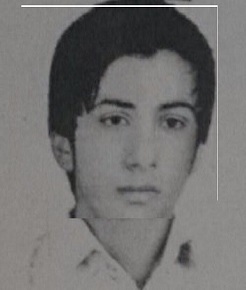|
Today was the last visitation for Alireza Tajiki: a young Iranian who, at the age of fifteen, was accused of a crime he denies having committed. Today, his family is left with no recourse inside Iran but to watch their loved one be hanged. Alireza’s brother says that their years-long efforts and the efforts of lawyers and civil society groups to prove his innocence and to obtain a retrial has fallen on the deaf ears of judicial authorities. Court documents contain no clear evidence against Alireza and there is another plausible suspect, but the odds have been against him. Clearly, a working-class family of modest means and no powerful friends in a small town like Fasa, Fars Province, is no match for judges bent on ignoring facts and punishing a 15-year old as an adult. Alireza Tajiki was arrested on May 16, 2012, at the age of fifteen and accused of the rape and murder of a friend. He was interrogated for weeks without the presence of a lawyer, intimidated, threatened, and tortured to confess to the crime. His family claims that he was at home and asleep at the time of the murder, but Branch 4 of the Fars Criminal Court would not be convinced.
Clearly,a family of modest means and no powerful friends in a small town is no match for judges bent on ignoring facts and punishing a 15-year old as an adult
The court has relied on coerced confessions that Alireza repeatedly denied during his trial, and are thus invalid based on Iranian law, as well as on the sentencing judge's “knowledge.” Not only has Alireza Tajiki maintained his innocence in court - but according to the family, there are witnesses and documents that would prove his innocence. But authorities have ignored his request for a retrial, which is made possible under article 91 of the Penal Code and would allow him to present the evidence and shed light on the flawed evidence leading to his conviction.
In his request for retrial, Alireza noted several important points, including the following:
- The report of the autopsy conducted by the court’s medical examiner on May 20, 2012, was never entered in the evidence file. The report contains medical data which conflicts with the confessions Tajiki made during interrogation under physical and mental torture. The judge’s decision was based solely on these confessions.
- DNA and serological evidence was inconclusive, and could not implicate the defendant in the rape.
- Forensic evidence not only contradicts Alireza's confessions, but also sheds doubt on the prospect that one person could have carried out the murder.
- Forensic evidence demonstrated that fatal knife wounds in the victim’s body did not match the knife described by the prosecution at trial. Neither the knife itself nor an image of it were presented at trial.
- Tajiki’s investigating judge had ordered the victim’s text messages printed out for the court. They were not, however, included in the evidence file, without any explanation.
- A cell phone company’s records could have been investigated more thoroughly.
- Tajiki says he sent a text message which split into three parts between 12:14:05 and 12:14:15 to the victim. They were received, though the victim did not respond. The telephone company’s records show Tajiki and the victim were in different locations at the time.
- In Tajiki’s first confession, he claimed that the victim left his bicycle in a clear space in an alley. The victim’s friends and those who went looking for him found no such bicycle.
- Despite clear causes for uncertainty in the case, which a minority of investigators themselves noted, proper further investigations were not conducted.
In Alireza’s case, Iranian judicial authorities have ignored Iranian law as well as Iran’s international commitments. The Islamic Republic of Iran has signed and ratified the Convention on the Rights of the Child, which strictly prohibits the execution of anyone for crimes committed under the age of 18. Since Alireza’s sentencing, the family has seen nothing but closed doors including at the Supreme Court, the Judiciary’s Human Rights Council, and the Supreme Leader’s Office. No clear justification is given to the family or all those who over the past few years have worked to save Alireza from the gallows. For the past five years, the life of the Tajiki family has been a roller coaster of fear, anxiety, outrage, hope, and disappointment.
Today, at the last hour, Alireza Tajiki needs the support of the international community and most importantly, he needs the attention and the intervention of officials at the highest level of the Iranian government. Iran’s President has repeatedly promised Iranians their citizenship rights and Alireza Tajiki is a citizen whose rights have been, and continue to be, violated. It is time for Mr. Rouhani to turn his attention to an urgent and recurrent problem in the country: the absence of the rule of law and the minimum standards of fair trial. Stopping the execution of a child offender and ensuring that he gets a fair retrial would be a good start.
Background: Alireza is just one of Iran’s juvenile offenders – children who the country’s judiciary continues to try and sentence to death in clear violation of international law. For more on their plight, consult ABF’s project resource, “Too Young To Die: Juvenile Executions in Iran,” including an interactive map plotting the more than 115 instances of minor execution which the Iranian judiciary has carried out since 2000.
|
